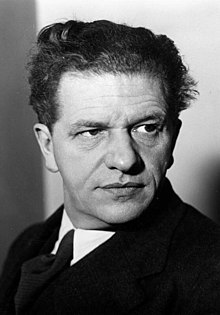Hanns Johst
| Hanns Johst | |
|---|---|

Johst in 1933
|
|
| Born |
8 July 1890 Seerhausen bei Riesa, Kingdom of Saxony |
| Died | 23 November 1978 (aged 88) Ruhpolding, Bavaria, West Germany |
| Allegiance |
|
| Service/branch | German Army in World War I and Waffen SS in World War II |
| Years of service | 1914–1918 and 1939–1945 |
| Rank | SS-Gruppenführer |
| Commands held |
|
| Battles/wars | |
| Awards | SS-Honour Ring |
Hanns Johst (8 July 1890 – 23 November 1978) was a German playwright and Nazi poet laureate.
Hanns Johst was born in Seehausen as the son of an elementary school teacher. He grew up in Oschatz and Leipzig. As a juvenile he planned to become a missionary. When he was 17 years old he worked as an auxiliary in a Bethel Institution. In 1910 he earned his Abitur in Leipzig and then started studying medicine and philosophy and—later—history of art. He volunteered for the army in 1914. In 1918 he settled down in Allmannshausen (part of Berg) at the Starnberger See.
His early work is influenced by Expressionism. Examples include Der Anfang [The Beginning] (1917) and Der König [The King] (1920). Later, he turned to a naturalist philosophy in plays such as Wechsler und Händler [Money changers and Traders] (1923) and Thomas Paine (1927).
Bertolt Brecht's first play Baal was written in response to Johst's play Der Einsame [The Lonely], a dramatization of the life of playwright Christian Dietrich Grabbe. In 1928 Johst joined Alfred Rosenberg's "Kampfbund für deutsche Kultur" (Militant League for German Culture) designed to combat "Jewish" influence in German culture. In 1932 he joined the Nazi party, explaining his agreement with Hitler's ideology in the essay "Standpunkt und Fortschritt" [Standpoint and Progress] in 1933.
When the Nazis achieved power in 1933, Johst wrote the play Schlageter, an expression of Nazi ideology performed on Hitler's 44th birthday, 20 April 1933, to celebrate his victory. It was a heroic biography of the proto-Nazi martyr Albert Leo Schlageter. The famous line "when I hear the word culture, I reach for my gun", often associated with Nazi leaders, derives from this play. The actual original line from the play is slightly different: "Wenn ich Kultur höre ... entsichere ich meine Browning!" "Whenever I hear of culture... I unlock my Browning!" (Act 1, Scene 1). It is spoken by another character in conversation with the young Schlageter. In the scene Schlageter and his wartime comrade Friedrich Thiemann are studying for a college examination, but then start disputing whether it is worthwhile doing so when the nation is not free. Thiemann argues he would prefer to fight than to study.
...
Wikipedia
